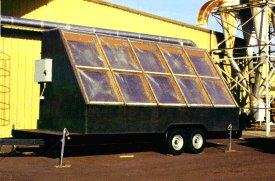Newsletter: Solar Kiln Drying Of Western Juniper Lumber

by Scott Leavengood, OSU Extension Service
from the Western Juniper Newsletter, Vol. 2, No. 2, Winter 1998.
Solar kilns are a low-cost technology used for drying wood. Solar kilns are essentially insulated boxes with plastic or glass panels on one side for collecting the sun's rays. The kilns can dry wood in less time and to a lower moisture content than is possible using air drying. In addition, solar kilns prevent the wood from becoming dirty or weathered as can happen during air drying and provide for some relief of drying stresses. The only energy costs involved are for the electric fans used to circulate the heated air within the kiln, and possibly to operate automatic vents.
Jim Reeb, Wood Products Extension Specialist for Oregon State University, designed and built a trailer-mounted solar kiln for research purposes (see image below). This kiln was delivered to Klamath Falls late in May of 1997 and has been tested on approximately 450 board feet of 5/4 western juniper.

The juniper lumber was sawn for a portable mill demonstration during OSU's Small-Scale Sawing and Drying Workshop held in Klamath Falls on June 10. The lumber was loaded into the kiln the morning after being sawn. Samples checked with a moisture meter revealed only that the material was green (above the upper limit of 30% on a hand-held moisture meter). After 6 days in the kiln, the wood had dried to about 20-25% moisture content. After 19 days in the kiln, the wood had dried to approximately 8-10%. Summer is undoubtedly the best time to dry wood in a solar kiln, but even so, 20 days to get from the log to a dried product is pretty good.
End and surface checking in the dried lumber was very minimal. However, warp (bow and crook) was very substantial. The top weight of green 6x6's was removed within 3 days of loading the kiln (some guy insisted on having the 6x6's for his raised bed garden!). Therefore it is possible that the warp could have been greatly reduced had there been adequate top weight throughout the drying cycle.
At publication time, we're readying the solar kiln to move to Connolly Wood Products in Bend, OR. If you'd like more information on solar kilns, please contact Jim Reeb, OSU Extension Service at (541) 737-4240.
Many thanks to Marc Kane at Reach Inc. in Klamath Falls for generously donating a space to park the solar kiln and electricity to power the fans. Thanks again Marc!